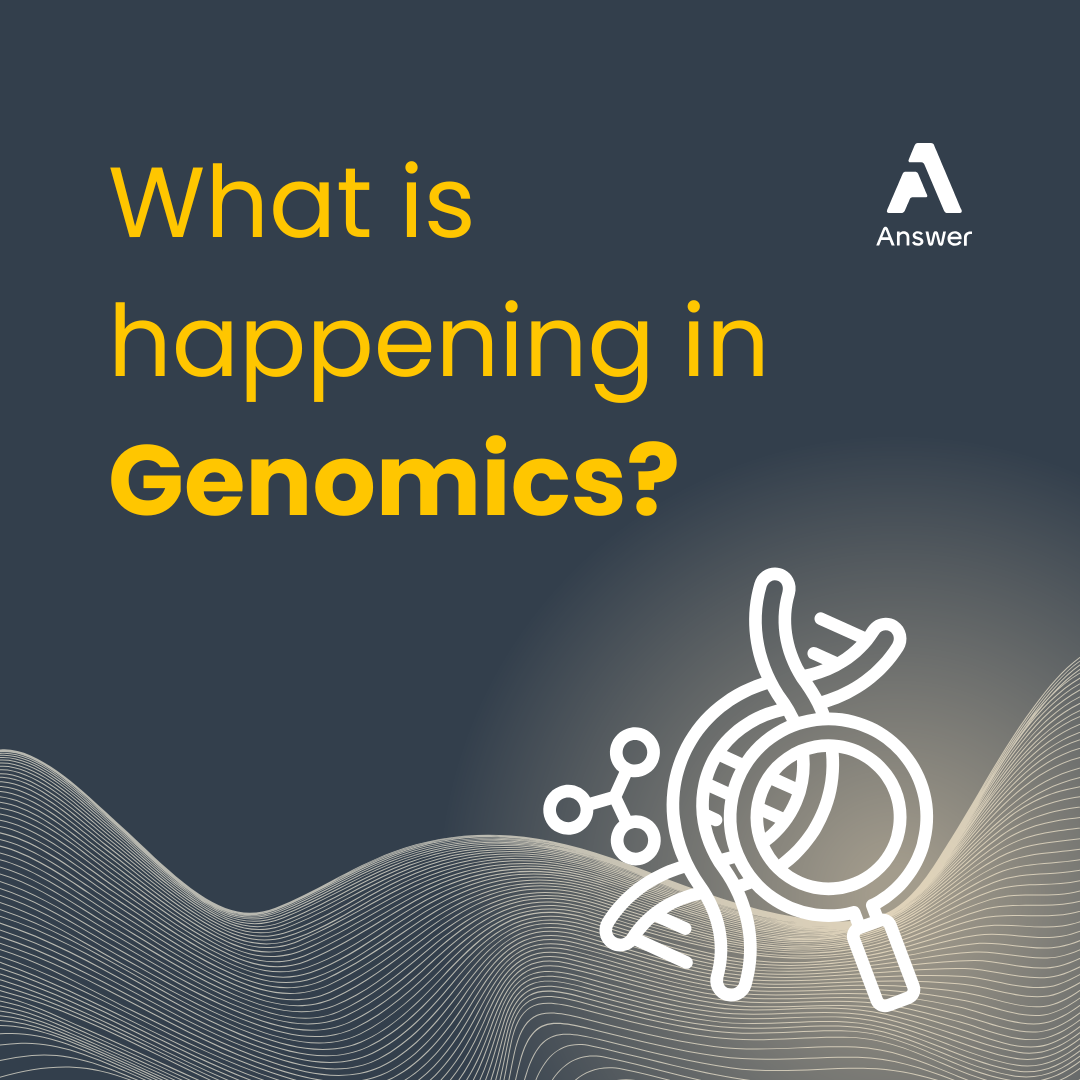
What's happening in Genomics?
Genomics is one of the most transformative fields in modern healthcare. By analysing our DNA, genomics enables more accurate diagnoses, earlier detection of diseases, and the potential for truly personalised treatment plans. And with AI now entering the conversation, we’re seeing rapid acceleration in how genomic data is interpreted, applied, and integrated into everyday care.
At Answer Digital, we’ve been at the heart of this progress — helping shape the infrastructure and interoperability required to turn groundbreaking research into real-world impact.
So, what exactly is genomics?
Genomics is the study of a person’s genes — their DNA — and how those genes interact with each other and the environment. It plays a critical role in identifying genetic variants that could lead to disease, understanding how a patient might respond to certain treatments, and guiding precision medicine.
In the NHS, genomics is central to the future of care. From cancer diagnostics to rare disease identification, it’s helping clinicians make faster, better-informed decisions for patients across the country. With the publication of the NHS 10 Year Plan, genomics has been identified as a cornerstone of NHS strategy.
Our role in building the future
At Answer Digital, we’ve partnered with the NHS England’s Genomic Medicine Service to deliver a programme of digital transformation projects to improve interoperability across genomic systems — helping link up test ordering, clinical interpretation, and data sharing in a unified ecosystem.
In our latest genomics project, we supported the development of a national interoperability strategy to future-proof NHS genomics infrastructure. From digital referrals to bioinformatics workflows, we’re enabling data to move securely and seamlessly across the healthcare system. You can read more in our case study here: Genomics Interoperability for a Unified Healthcare Future
Insights from recent events
We’ve recently attended and contributed to a series of important events focused on the intersection of genomics and AI — including the NHS Genomic AI Network Masterclass. We also ran a TechUK’s session providing an update to NHS organisations and other consultancies on advancing test directory standards.
Across these recent events, some key themes emerged:
1. AI is already shaping genomics — but regulation is catching up
One of the standout insights from the Genomics AI conference was that UK legislation for AI-powered medical devices is finally being updated — the current framework dates back to 1994. New rules are set to better align with EU standards and will apply to any AI software that serves a medical purpose (e.g. diagnosis or monitoring).
That means clearer guidance is coming — but so is a heavy compliance burden. Approval for these tools will require deep scientific, analytical, and clinical validation — often resulting in 2,000+ page regulatory reports. Startups and NHS adopters alike will need clear business value and robust evidence before taking AI tools forward.
2. Eligibility criteria are a challenge
One area of debate was around assessing patient eligibility for genomic testing. When a patient is mistakenly thought to be eligible for a particular test, and that test is ordered, this error can take 3–4 weeks to detect and correct, potentially delaying care. As AI is used more widely in this space, it’s unclear where the line lies between a supportive software tool and a regulated medical device.
Delegates at the event discussed platforms like QGenome that are already helping bridge this gap — but consensus is needed on how far such software can go before hitting the regulatory threshold.
3. GEL is innovating with AI — out of necessity
Genomics England Ltd gave a demonstration of how they are using AI to keep on top of new gene targets for panels in genomic testing. With more than 40,000 scientific papers published globally every week, it’s impossible for humans to keep up with the latest research.
GEL has developed an AI solution that reads, filters, and extracts relevant insights from this firehose of data — helping scientists update panels and discover new diagnostic targets. It’s a smart response to a real operational pressure — and a powerful example of AI adding value without compromising safety.
4. Better data = better results
Bioinformatics pipelines — the systems used to analyse genome data — are only as good as the data that goes in. The event reinforced that including Human Phenotype Ontology (HPO) terms in test requests significantly boosts the accuracy of variant detection. It’s a simple but crucial step in improving outcomes.
The adoption gap
Despite all this innovation, many people working in NHS trusts and care settings still aren’t sure where AI fits in, how to adopt it securely, or what governance they’d need to put in place. There’s a real need for support — and for trusted partners to help navigate the IG (information governance), clinical safety, and procurement landscape.
That’s where we come in. At Answer Digital, we’re helping bridge this gap by building the foundations, standards, and workflows that allow new technologies to be adopted safely and effectively.
Final thoughts
Genomics is no longer just a research field; it’s a frontline clinical tool. AI is not a future promise — it’s already here, reshaping how we interpret vast datasets, detect disease, and deliver care. But turning potential into progress requires more than great ideas. It takes interoperability, collaboration, and trust — and that’s what Answer Digital is proud to deliver.